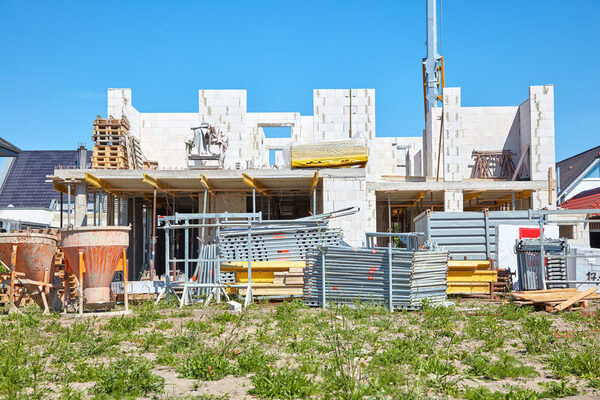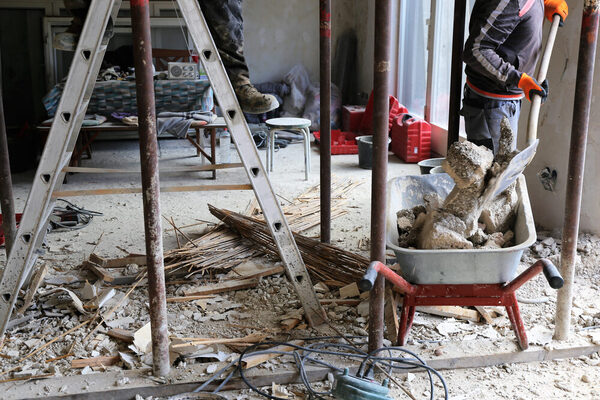People involved in the construction
The building owner & those involved in the construction are responsible for ensuring that the public law regulations are complied with during the construction, modification, maintenance, change of use or demolition of structural facilities, regardless of whether the construction project requires planning permission or does not require planning permission.
Client | Applicant
The applicant - i.e. the building owner - is referred to as the building owner in the building permit procedure. They are responsible for the lawful execution of the building project, compliance with public law regulations and compliance with the orders of the building inspectorate. Unless otherwise stated in the building application, the client is the contact person for the building inspectorate and the recipient of notices and orders. However, they do not have to be the owner of the building plot.
The building owner can be a natural person or a legal entity, and several persons can also act as building owners for a project. Each of these is then responsible for compliance with public law regulations. In such cases, a representative must be named to the building inspectorate.
The client must appoint a suitable designer, suitable contractors and a suitable site manager for the preparation, supervision and execution of a construction project that requires approval or is subject to notification.
Legal representation
The building owner can also be legally represented; this usually involves a legal entity as the building owner, such as an association or a limited liability company. The commercial or association register or the shareholders' agreement determines who may assume legal representation. This may mean, for example, that several persons may only act jointly.
Legal representation | Authorization
The client may be represented. The representative has the same rights and obligations towards the building inspectorate as the client. For this representation to be effective, the corresponding power of attorney must be clearly formulated and the activities to be performed must be explicitly specified.
Appointment of an authorized recipient at the request of the building inspectorate
If the client does not have a place of residence, habitual abode or management in Germany, they must appoint an authorized recipient in Germany (Section 15 of the Hessian Administrative Procedure Act), as documents cannot be delivered abroad or can only be delivered with difficulty (by means of consular participation).
Author of the design | Authorized building designer
The drafters must be suitable for the preparation of the respective construction project - both professionally and in terms of their experience. They are responsible for the planning, the conformity of the various planning documents and the completeness of the evidence, for the correct execution and for the choice of the right building products. They must always sign personally.
Limited (small) authorization to submit building documents
Graduates with a state-recognized bachelor's degree (six or eight semesters) in the fields of structural engineering and interior design as well as civil engineering, master craftsmen in the main construction trade and construction technicians have the limited - also known as small - building submission authorization in Hesse. They are authorized to submit building applications for
- Residential buildings with no more than two apartments and a maximum total of 200 square meters of living space,
- single-storey commercial buildings with a maximum gross floor area of 200 square meters and a wall height of three meters,
- smaller agricultural buildings in building classes one to three up to 200 square meters of gross floor area on the first floor,
- garages up to 200 square meters of floor space.
Special building submission authorization for interior designers
Persons who are permitted to use the professional title "interior architect" or "interior designer" under the Hessian Architects and Town Planners Act are authorized to submit building proposals for the structural alterations to buildings associated with this professional task in addition to the small building submission authorization. Questions regarding the interpretation of this definition of professional tasks or the existence of this building design authorization must be clarified before a specific building permit procedure is carried out.
Unrestricted (major) authorization to submit building documents
Persons who are entitled to use the professional title of "architect" or who are entered in the list of engineers authorized to submit building proposals are generally authorized to submit proposals for all construction projects.
§ Legal basis
(Inspection) experts | authorized verifiers | specialist planners
Experts
Inspection experts with appropriate qualifications are commissioned by the building owner. They check and certify compliance with building code requirements in their respective specialist area, insofar as this is provided for by law. For example, experts certify the correctness and completeness of the structural engineering certificates for stability, including the fire resistance duration of load-bearing components, the correctness of the certificates for preventive fire protection, the measurement of buildings and the functionality of energy generation systems.
The responsible experts certify compliance with public law regulations for safety-related systems and equipment.
- Test experts for fire protection - AKH - Test experts for fire protection (portal-akh.de) (opens in a new tab)
- Engineer search (opens in a new tab)
- Inspection experts for stability (opens in a new tab)
- Surveyor for surveying (opens in a new tab)
- Inspection experts for power generation plants (opens in a new tab)
- Inspection experts for technical systems and equipment in buildings (opens in a new tab)
Authorized persons
Authorized inspectors prepare the structural engineering verifications and must monitor and certify the proper execution of the construction:
- Stability including the fire resistance duration of load-bearing components,
- preventive fire protection,
- sound insulation,
- thermal insulation.
The Hessian Ordinance on Authorized Inspectors (NBVO) regulates the qualifications and duties of authorized inspectors.
Specialist planners
Some special planning services such as statics, outdoor facilities or technical equipment for buildings are often provided by specialist planners. The corresponding specialist drafts must be signed by the specialist planners responsible for them. The author of the design remains responsible for the proper interaction of all specialist designs.
Site management
The site manager must supervise the professional execution of the construction project in accordance with the building permit and be accountable to the building inspectorate under public law.
If he or she does not have the necessary qualifications (expertise and experience) in certain areas, suitable persons must be appointed to supervise the construction work. It remains the task of the site manager to coordinate the activities of the specialist site managers with their own activities.
With the reports on the construction status (shell and final completion), the site managers declare that the construction work complies with both the building permit and public building law.
Construction company
The construction companies are responsible for the proper execution and safe operation of the construction site. They ensure the correct use of construction products and take care of the corresponding certificates. They must have the expertise and experience required for their work.
Neighborhood
In principle, neighbors are not parties involved in the construction within the meaning of the Hessian Building Code.
Neighbors in the sense of building regulations are the owners (including hereditary building owners or usufructuaries) of adjacent properties that directly adjoin the building plot - this also includes properties that only meet the building plot at one corner - and whose interests protected under public law may be affected by the building project. This may be the case, for example, with a property opposite if the distance area exceeds the middle of the street or if underground parking accesses could affect the residents of buildings opposite if the street is narrow.
The definition of neighbor in planning law, on the other hand, is much broader: A neighbor within the meaning of planning law can be any neighbor in the planning area affected by the project.
Tenants or leaseholders of a property, on the other hand, are not neighbors within the meaning of public neighbor law under both the Hessian Building Code (HBO) and planning law.
Signatures
All application forms must have original signatures. At least two original signed copies of all other building documents must be submitted to the building inspectorate; copies of the remaining documents may be attached.
Client
In principle, the building owner signs all application forms, such as the building application, applications for deviations, exceptions and exemptions as well as notifications in accordance with Sections 63 and 64 HBO. Unfortunately, electronic authentication of applicants or drafters is not yet possible. A corresponding electronic procedure is currently being prepared and is expected to be introduced by the end of 2022. It should then also be possible to process building permit procedures completely digitally in accordance with the requirements of the Online Access Act.
Author of the design & designer
The author of the design shall sign the building application and the notification pursuant to Section 56 HBO and, if required, also the notification pursuant to Section 55 HBO. In addition, he or she signs all building documents, including specialist plans, unless the factual conformity of the design planning with the specialist plans is confirmed in a separate declaration of conformity.
Specialist planner
Specialist designs must be signed by the specialist planners responsible for them.
Experts & surveyor
Experts sign the documents they have prepared or examined.






